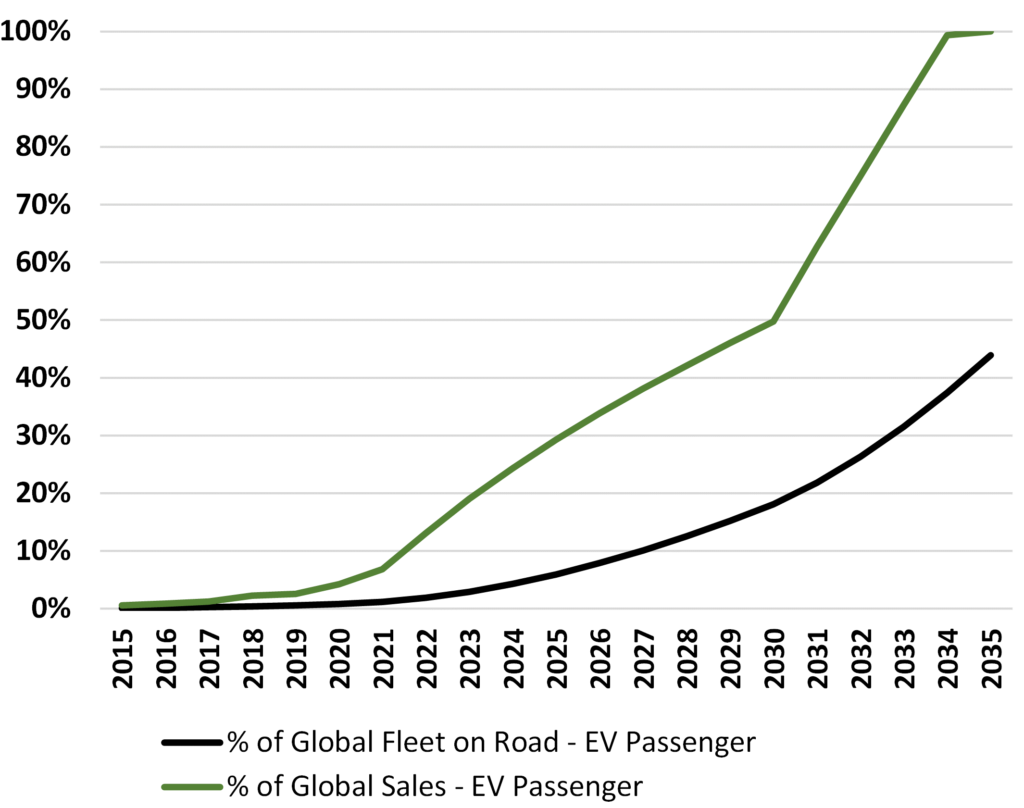The transportation industry has significantly transformed in recent years due to the rise of electric vehicles (EVs). In an effort to reduce carbon emissions, governments around the world are pushing for the adoption of clean energy sources, making EVs an increasingly attractive choice for many consumers.
Even though EVs still make up a small portion of global vehicle sales, they are projected to be the leading force in the transportation sector in the near future. This has sparked discussion on whether the rapid growth of EVs will cause a major disruption to the oil industry, which has long been the foundation of the global energy industry.
Current State of the Electric Vehicle Market
Electric vehicle sales have seen remarkable growth in the past few years, with 10 million EVs sold in 2022 and 14% of all new cars sold being electric. This is a vast improvement from only 9% in 2021 and 5% in 2020.

Image source: eipinvestments
This success has resulted in a total of over 26 million electric cars on roads across the world, a 60% increase from 2021. This surge in EV sales is part of the larger goal to reach zero-emission targets by 2050, and the industry is preparing for this goal.
Several factors have contributed to this surge in popularity. Governments worldwide are implementing stringent emission regulations as part of their commitment to combat climate change. Additionally, advancements in battery technology have improved driving range and reduced costs – making EVs more accessible to consumers.
Impact on Oil Demand
As the world transitions to electric vehicles, the need for oil will be replaced by the need for electricity. With increasing numbers of people transitioning to EVs, it is reasonable to assume that there will be a direct impact on oil demand.
According to research, every additional 1% market share gained by electric cars reduces global gasoline consumption by approximately 30 thousand barrels per day (bpd).
While this may not seem substantial at first glance, considering daily global oil consumption exceeds millions of bpd, it should be noted that these changes occur gradually over time as adoption rates increase significantly. In fact, some experts predict that if current trends continue unabatedly, mass adoption occurring faster than anticipated.
Challenges for the Oil Industry
The rise of electric vehicles poses several challenges for the oil industry. Firstly, a decline in gasoline demand will directly impact oil refineries that primarily produce fuel for internal combustion engine vehicles. These facilities may face significant financial strain as they grapple with reduced profitability and surplus production capacity.
Secondly, as electric vehicle adoption increases, there will be a corresponding decrease in demand for other oil-based products, such as lubricants and motor oils. This shift could disrupt existing supply chains and force companies within the oil industry to reevaluate their business models.
Furthermore, governments worldwide encourage EV adoption by implementing policies to phase out fossil fuel-powered vehicles. Some countries have set ambitious targets to ban new gasoline or diesel car sales entirely within the next few decades. Such policies can significantly impact long-term investment decisions within the oil sector.
Diversification Efforts by Oil Companies
Recognizing these potential challenges, many major players in the oil industry have begun diversifying their portfolios to include renewable energy sources alongside traditional hydrocarbon assets.
For instance, some companies are investing heavily in renewables like wind and solar power generation and battery storage technologies. By doing so, these companies aim to position themselves strategically for an evolving energy landscape where fossil fuels play a diminishing role.
Additionally, partnerships between automakers and oil companies are emerging to facilitate charging infrastructure development. This collaboration demonstrates how both industries recognize the importance of adapting to changing market dynamics while ensuring continued revenue streams.
EVs Gaining Momentum: Is the Oil Industry in Peril?
While it is premature to predict an immediate demise of the global oil industry due to increased electric vehicle production and mass adoption – it is evident that this transition presents substantial challenges that cannot be ignored.
The current data indicates a clear trend towards the electrification of transportation globally. As more consumers embrace EVs driven by environmental concerns coupled with government incentives, this sector has the potential for further growth over time.
As a result, it becomes imperative for the oil industry to adapt and diversify its operations. Companies that recognize this shift and invest in renewable energy sources, electric vehicle charging infrastructure, and other related technologies will likely be better positioned to thrive in a future where traditional fossil fuels are no longer dominant.
Ultimately, while the decline of the oil industry may not happen overnight – it is undeniable that an increase in EV production and mass adoption will have a transformative impact on how we power our transportation systems and shape the global energy landscape for years to come.


